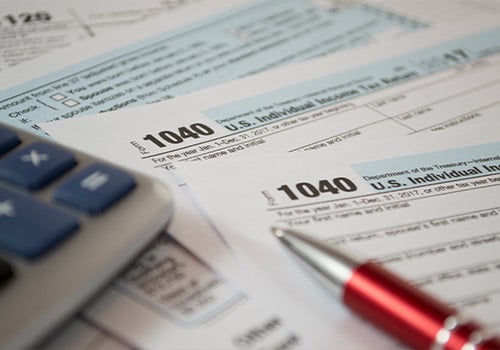Many people think that they must file an income tax return when tax time rolls around, regardless of how much money they make. That is simply not true!
Whether or not you need to file a return is based on your gross income and filing status for the year, but you might be surprised to learn that you do not need to file a return at all in some cases. So, when do you need to file and when can you just not worry about it?
Just because you are not required to file for a specific tax year doesn’t mean you shouldn’t. Sometimes, you might need to file a return with the IRS to get a refund.
Keep reading; we will tell you everything you need to know about filing your income taxes.
Do You Have To File Taxes Every Year?
Your filing status and gross income will determine whether or not you need to file taxes each year. If you earn more than the standard deduction for your status, you must file a Federal tax return.
Some special cases might require you to file taxes even if you earned as little as $5 during the year.
- For instance, the IRS filing requirements state that all self-employed individuals must file a return regardless of gross income.
- In addition, if you are married filing separately, each spouse will need to file a return if they earned more than $5 for the year.
We will discuss the income limits and requirements in more detail in the next section, but it is important to note that many taxpayers choose to file a return even if they are not legally required to do so.
- There are many tax refunds and credits available that you might miss out on if you choose not to file a return.
- You should also remember that your state has filing requirements that might differ from the IRS requirements. Even though the IRS may not require a return, you might still be required to file state taxes.
Filing taxes is not extremely difficult, but make sure that you follow the rules when the tax deadline comes around. Failing to file a return can result in lost tax refunds, penalties, and fees.
KEY TAKEAWAYS
- Most people who only receive Social Security will not be required to file a return.
- If your income was below the standard deduction and you aren’t due a refund, you may be able to avoid filing taxes.
- Self-employed individuals will need to file a tax return regardless of the amount of income they earn.
IRS Income Tax Return Filing Requirements
So, how much do you have to make to file taxes? A couple of IRS publications detail the requirements for filing a Federal tax return.
Those are IRS publication 17 and publication 501. Generally, there is no need to file a tax return if your gross income is less than the standard deduction.
Reason NOT to File Taxes
In 2024, the standard deduction for a single individual less than 65 years old was $14,600. As long as you earned less than this income threshold last year, there would be no need to file a Federal income tax return.
However, you might still choose to do so if you are due some money back.
For instance, suppose you earned $10,000 but had $500 in Federal taxes withheld. You would be due a refund of the entire $500. Failure to file a return means you will not get this refund back.
What about older individuals who are receiving Social Security benefits?
- Most people who only receive Social Security will not be required to file a return because their gross income will not be high enough.
Children or dependents generally do not have to worry about filing returns because they usually have little to no taxable income.
However, there may be instances when a dependent child is old enough to work and earn income. If the child’s gross income exceeds $1,100, the child might be required to file.
If you receive unemployment benefits during the year, you usually do not have to worry about a tax bill. The IRS and most states will exempt most unemployment benefits from income tax requirements.
Reasons for Filing Taxes
- If you are married and filing separately, you must file a return.
- In addition, if you have other income, like interest income or income from an IRA or retirement account, then you might be required to file a return.
- Self-employment almost always means that you will be filing an IRS tax return. Those individuals must file a return if they have any self-employment income to report on their tax forms.
If you have any questions about whether or not you need to file taxes, you should always consult a tax professional.
Failure to file can be illegal and cause you to miss out on tax refunds owed to you.
Must read articles related to Taxes
- The ins and outs of OASDI tax.
- What are the benefits of married filing separate?
- How long should you keep tax returns?
- Reducing college expenses with the American Opportunity Credit.
- Check the status of your state refund.
State Tax Filing Basics
You might wonder, “Do I have to file a tax return in my state?” Many states have rules that are very similar to the IRS. In most cases, if you are not required to file a Federal return, you will not be required to file a state return either.
However, make sure you are familiar with the rules in your state. You might also encounter special situations requiring you to file a return in multiple states.
If you live in one state but work in another, you will probably have to file a return in both states. Some states have no state income tax requirements, so you never have to worry about filing an income tax return in those states.
The biggest thing is to know the rules where you live and work and follow them when deciding whether or not to file a return.
How To File Your Tax Return
The process of filing an IRS 1040 is easier now than ever before. Many software programs available will complete all the necessary forms for you.
You must fill in the details from your W2 and personal information. The software will perform all the calculations and prepare the necessary forms for filing.
Paper Filing
Now, if you still prefer to complete the paperwork manually, you can still do so.
In that case, you would complete all the paperwork and perform all the calculations by hand.
- Ensure you include the proper identification number and double-check your calculations.
- You will also want to make copies of the forms before submitting them.
- Once you drop your returns in the mailbox, they are considered filed!
e-filing
If you prefer making things easy, e-filing is the way to go. When you are ready to e-file your taxes, you simply need to click a few buttons on your computer.
- The software does all the hard work, and your forms are electronically submitted to the IRS and your state.
- E-filing makes things much easier and allows you to receive your refund or tax credit payments faster.
- You include your bank account information when you submit your return. The IRS uses this information to direct deposit your refund.
This is the quickest way to get a refund, and most filers today use this method. Many tax software companies also guarantee their calculations, so you do not have to worry about any miscalculations costing you money on your return!
So, when do you have to file taxes? Generally, the filing deadline is April 15
Rules For Non Citizens
Just because you are not a citizen does not mean that you are free from filing taxes. Non-citizens living in the United States and earning income are likely to be required to file taxes as well.
The requirements depend on the source and amount of the income, tax filing status, and the country in which you are a citizen.
You will need a valid individual tax identification number (ITIN) to file taxes. This is usually a Social Security number, but the IRS will assign you an ITIN if you do not have a Social Security number.
In some cases, you might even be required to file estimated taxes with the IRS, depending on your job situation in the United States.
You can visit IRS.gov to learn more about the special tax rules regarding foreign exchange students. These rules also apply to teachers and researchers as well. Several special exemptions allow these individuals to earn income without needing to file a tax return.
TIP
Even if you are not obligated to file a tax return, it might still be in your best interest. You may be eligible for tax credits and funds by filing a return.
Tax Refund Considerations
Nobody likes filing a tax return, but everybody likes to get a refund! As we mentioned before, you might encounter situations where you are not required to complete an IRS tax filing, but you may choose to do so to get a refund to which you are entitled.
Here are a few refunds for which you may be eligible. This may help you decide whether or not to file a return for the year.
Child Tax Credit
If you have children, this credit alone might make it worth filing taxes. If you are the head of household, you may be due a credit of up to $2,000 per dependent child, depending on the child’s age.
This is a huge benefit for families with multiple children and can lead to a large tax refund. Make sure that you know how this credit affects your household so that you can take full advantage of it.
American Opportunity Credit
If you are currently paying for college expenses, this tax credit can help you cover some of those costs. This credit is for people who are paying for their first four years of higher education.
You can get as much as $2,500 per year per eligible student, so this credit can add up quickly – especially if multiple students are in the household!
Lifetime Learning Credit
This credit can be worth up to $2,000 per tax year. It can help pay for expenses related to undergraduate or graduate degree programs and can even be used for job-related training.
Unlike the American Opportunity Credit, it is not required to be used for the first four years of higher education. This credit allows you to continue learning and receive a tax break for your schooling.
Child and Dependent Care Tax Credit
This tax credit can help pay for childcare expenses while the parent works. You can claim up to $6,000 in eligible expenses, which can be significant credit.
Unlike the earned income tax credit (EITC), this is not just for low-income households. You can use this credit even if your income is in a higher tax bracket.
Penalties For Not Filing Taxes
If you do not request a tax extension or file your taxes by the due date, there can be stiff penalties. Not only might you miss out on some premium tax credits, but you might also owe some fines and penalties.
The penalty can be up to 5% of the unpaid tax which was due. In addition, these penalties can add up each month your return is late. So, the later you wait to file, the larger the penalties will become.
If you choose not to file, the IRS will likely eventually come knocking on your door. The IRS has the authority to contact you and impose the abovementioned penalties.
You might end up in court owing a hefty bill when everything is said and done. If you are required to file taxes, you should do so in a timely manner.
The Bottom Line
Just because you earn money during the year does not necessarily mean you must file taxes. However, the amount that you earn and your filing status can determine whether you will have to file a return or not.
Just because you are not legally required to file a return doesn’t mean it will not be a good idea. You might be due some money back, and you would hate to miss those refundable tax credits simply because you chose not to file your tax return.
Talk to your tax professional and determine whether you should file a return this year.
Frequently Asked Questions
Maybe you’re wondering, “Do I need to file taxes?” It depends on your filing status. For individuals under 65 filing individually, the minimum income to file taxes is $14,600.
However, if you are reporting self-employment income, you will need to file a return at a much lower level.
If you are married and filing separately, then you are required to file even if you have as little as $5 of income.
As we mentioned before, just because you don’t have to file doesn’t mean you should not. If you earned less than the standard deduction of $14,600 but had federal taxes withheld, you should file so that you can get your refund of that amount back.
Yes, small businesses are required to file taxes just like individuals. Your LLC must file taxes regardless of how much income it had during the year.
Filing taxes for a business can get more complicated, so make sure that you get the help of a tax professional when going through that process. Incorrect filings can lead to fines and penalties, so you must ensure things are done correctly.
Many people today use TurboTax or some other tax software to e-file their taxes. This is the quickest and easiest method available.
You can still complete paper forms and mail those to the IRS if you prefer. However, this method is much slower and more cumbersome.
E-filing is the preferred filing method, and it will also allow you to get your refund faster.
If your only income is from Social Security, you will likely not be required to file taxes. However, you will probably have to file if you have other income besides your Social Security.
If you are married and each of you receive Social Security, you might also be required to file. The answer lies in the total amount of your income and your filing status.
A Social Security tax limit also prevents you from paying OASDI tax above a certain income level.
You can find a Social Security Administration office near you by using our SSA office locator and searching for your closest location.





